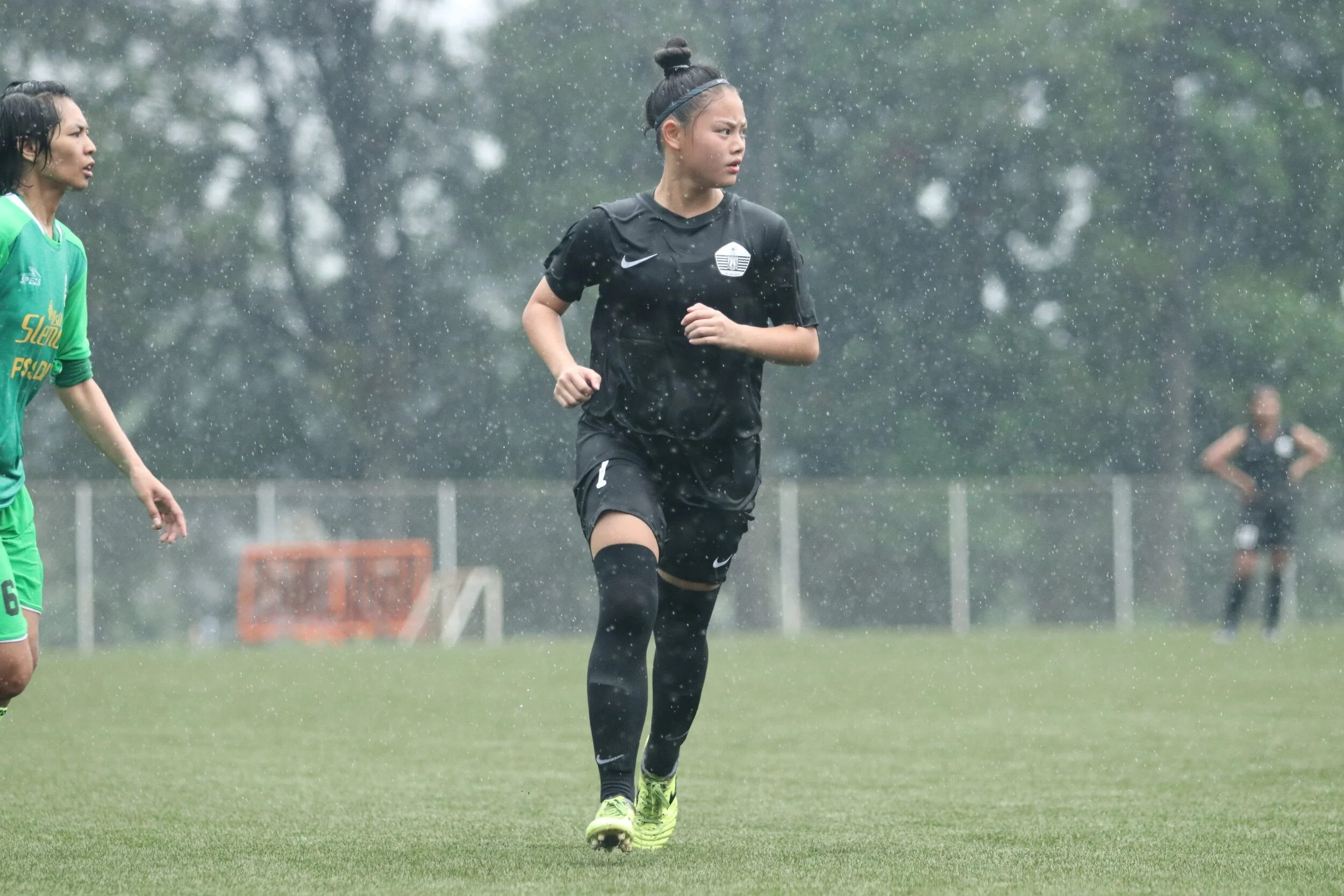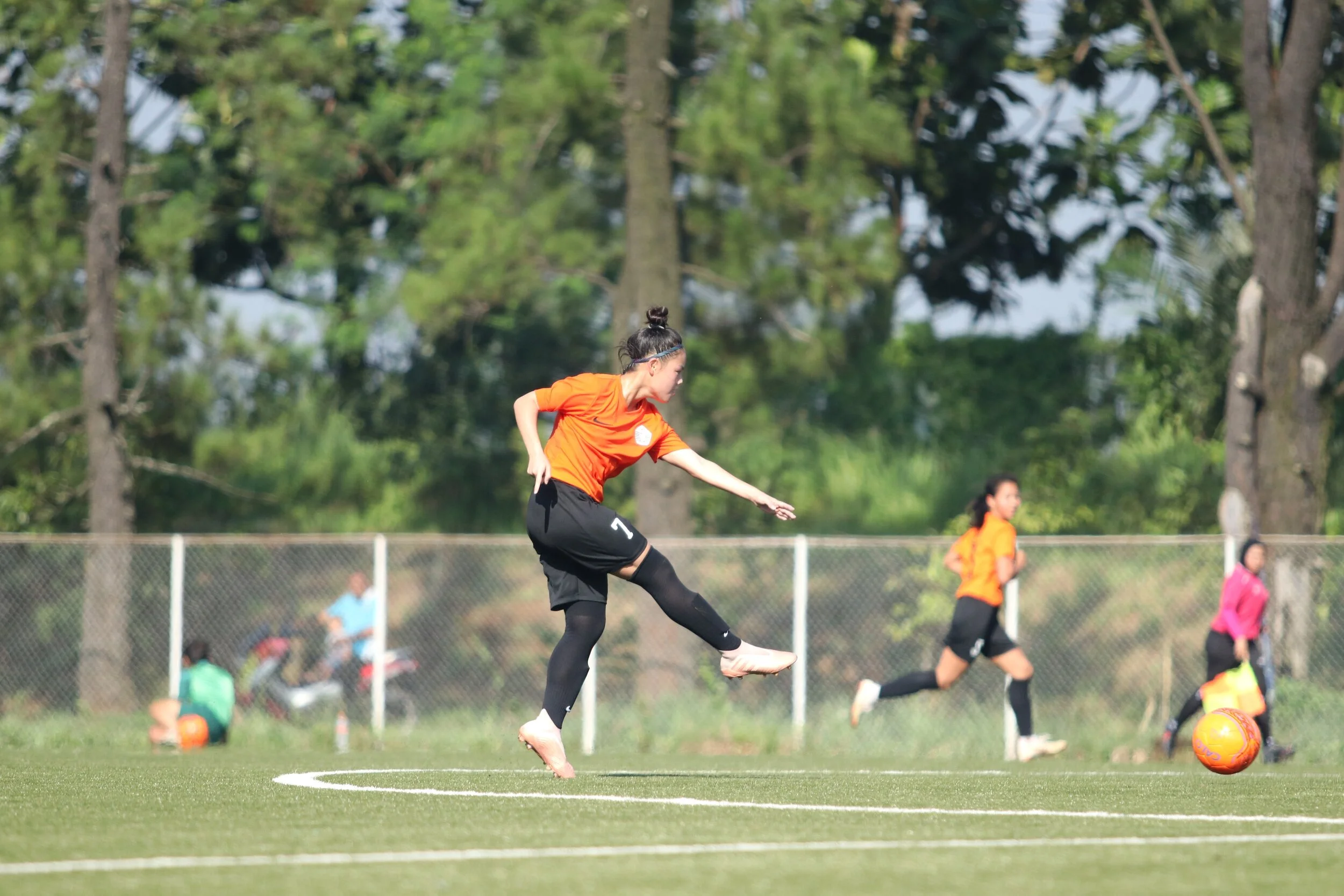Field of Dreams
Dhanielle Daphne spent years trying to convince her parents that football was the right sport for her.
Dhanielle Daphne has lost count of the number of times she has been met with incredulous looks and raised eyebrows when people learn she is a football player – and a successful one. The 19-year-old is a celebrated midfielder in the Indonesian women’s national football team, and a passionate fan who knew she wanted to play the game from an early age.
“My family and friends didn’t really support my decision at first, because nobody in my family plays football and it isn’t seen as a woman’s sport from most people’s perspective,” she says.
Daphne was not ready to give up, and spent years trying to convince her parents that football was the right sport for her.
“My first experience was certainly disappointing, because so many people around me tried to put me down instead of encouraging me to play,” she says. “But it didn’t stop me from trying to prove that I [could]. I knew this was what I wanted to pursue, and I trained hard to show that I could do better than most of the boys on the field.”
Her parents soon changed their tune. “They now fully support me [in pursuing] my dreams,” Daphne says.
She received her first call-up to the national team for the Asian Games after playing in Indonesia’s highest level women’s football competition, the Pertiwi Cup, in 2017.
“Playing for the national team was the best feeling ever, especially on a stage as big as the Asian Games,” she says. “I had dreamt about this since I was a kid.”
Indonesians are crazy about football but, as in most other countries, tend to regard it as predominantly a male domain – and that applies to the players themselves, to the league, the Football Association of Indonesia (PSSI) and the fans.
Nesya Febi Ramadhita, 26, became a devoted football fan after watching the 2002 World Cup with her family and found herself rooting for the German national team – and in particular, striker Miroslav Klose and goalkeeper Oliver Kahn.
“Afterwards, I learned a lot of things about football and Germany,” she says. “I was only eight years old and thought that maybe at some point I would root for a different team, but nothing has changed.”
Nesya Febi’s love of the game went beyond the German national team to club football. As a supporter of FC Bayern Munich, she regularly wakes up in the middle of the night to watch her favourite team compete in the Bundesliga, the German Cup and the Champions League. Still, she often feels she is not taken seriously as a football fan. Even some of her friends say her passion for the game is a joke.
“I don’t know why they say that,” Nesya Febi says. “I never like a football player because of their looks but for their talent, so I often argue that women are perfectly capable of liking football, understanding football and playing football.”
Her love for Bayern Munich and the German national team was nurtured when she moved to the German city of Jena in 2012 to study communications. She was based there for seven years and regularly travelled to Munich to watch games at the stadium.
“Do not underestimate female football fans, because they also truly like football and it is their passion,” she says.
Nesya Febi at the Allianz Arena.
Indonesia is now reappraising women’s interest in the game. The PSSI, whose secretary general, Ratu Tisha Destria, is the first woman to hold the position, introduced the national women’s premier league, Liga 1 Putri, in October last year.
Although the Indonesian women’s national football team first took part in the international AFC Women’s Championship (now known as the AFC Women's Asian Cup) in 1977, it was then largely forgotten until the recent renaissance. Then, in 2015, a former Indonesian national team member and midfielder for the Persipura Jayapura club, Rully Nere, was appointed as head coach of the women’s national team.
Veteran sports broadcaster Pangeran Siahaan says there was almost no development of women’s football in the country until a couple of years ago, but it has since seen significant progress.
“Last year’s Women’s World Cup was well received and followed by a sizeable number of football fans here in Indonesia, and it was also given exposure by local media,” he says. “The abundance of information about world football on the internet really helps, and I think some football fans in Indonesia are now familiar with the likes of [US players] Alex Morgan or Megan Rapinoe. I think this is a foundation that can be built on in the future.”
The media has assisted the advance of women’s football in Indonesia, Pangeran says. “The fact that there are now live broadcasts of the women’s league indicates that there is an eagerness to really grow and harness women’s football, not only as a sport, but also as an industry. We still have a long way to go, but it’s really encouraging.”
He has seen his fair share of prejudice against women during his career as a football broadcaster. Not only are women not taken seriously as football fans, he says, he cannot recall ever having worked with a female football expert on television.
“When I worked with women on football broadcasts, they were either the host or the quiz presenter with a bare minimum of football knowledge,” Pangeran says. “I know some really knowledgeable female football journalists but I don’t think they’re given enough exposure on TV. Most of the time women are given airtime on football broadcasts for visual purposes only. It’s really a thing that needs to change immediately.”
Daphne also thinks it is time to take a stand in support of women’s football.
“It would be a much better environment if we could spread positive energy and support young girls in football instead of trying to put them down,” she says, noting that most Indonesians are football fans. “I believe if women’s football gets the right support and coverage, it would be a very big industry.”
Daphne moved to the US recently when she was awarded a four-year academic scholarship by Oregon State University.
Daphne, who fell in love with football after watching David Beckham play and now cites US woman footballer Tobin Heath as her favourite player, moved to the US recently when she was awarded a four-year academic scholarship by Oregon State University. Furthering her education, she says, will not stop her playing the game.
“I am still actively involved in football because I joined a soccer club – yes, that’s what they call it over here – and we play against other school teams around Oregon, which is very competitive for a non-NCAA event,” she says, referring to the National Collegiate Athletic Association, which organises the sports programmes of colleges and universities across the United States and Canada.
“It was a big step for [the Football Association of Indonesia] to start the national women’s football league in 2019 despite what the public said,” she adds. “It’s too bad I had to miss the euphoria because I left for university in September 2019. But football will always be something that I pursue and my goal is to be the first Indonesian to compete in NCAA women’s soccer.”
As for Nesya Febi, who returned to Jakarta last year and now studies at the London School of Public Relations, playing football is not an option. She lacks the skills, she admits with a laugh. But looking ahead, her plans for the future still involve the sport she is so passionate about.
“I have a dream to work for FC Bayern or the German Football Association in their communications department,” she says. “I know this will be hard, but people can always dream, right? And these two aren’t my only target. I’d be happy to join any football club or media company that is related to my favourite sport.”
This article was first published in the South China Morning Post on March 11, 2020.


